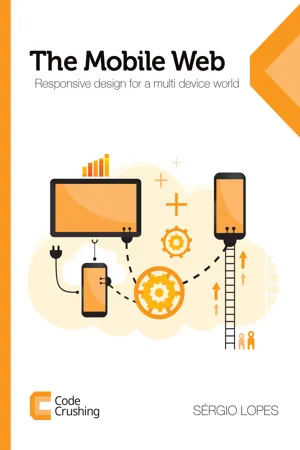
- 220 pages
- English
- ePUB (mobile friendly)
- Available on iOS & Android
eBook - ePub
About this book
With the amazing growth of mobile device usage, the internet has entered a brand new territory. Desktop-only websites are in the past. The web is now everywhere and your systems has to support mobile, TVs, wrist watches.. and even desktop! Develop the modern web, transformed by the world of mobile, touch-screens and other devices. Unveil the mysteries of good responsive design, mobile-first strategy, high resolution screens, HTML5 components and performance optimizations. Face the challenges and changes of the new Mobile Web and explore its limits!
Tools to learn more effectively

Saving Books

Keyword Search

Annotating Text

Listen to it instead
Information
Table of contents
- About me
- Capítulo 1: The Mobile Web
- Parte 1 - Mobile strategy
- Capítulo 2: The paths of a mobile strategy
- Capítulo 3: App or Web? Comparison of possibilities
- Capítulo 4: HTML 5 is different from HTML 5: the packaged apps situation
- Capítulo 5: Responsive design for a unique Web
- Capítulo 6: Mobile-first
- Capítulo 7: Market, browsers, support, and tests
- Parte 2 - Programming the modern Web
- Capítulo 8: Flexibility on the Web with fluid layouts
- Capítulo 9: Media queries: the best companions of a fluid layout
- Capítulo 10: Everything you want to know about viewport
- Capítulo 11: The saga of three pixels and the high resolution and retina screens
- Capítulo 12: Do not remove the zoom from your users
- Capítulo 13: Always use media queries based on the content of your page
- Capítulo 14: Mobile media queries first or Desktop first?
- Capítulo 15: The media queries for different resolutions and retina
- Capítulo 16: Media queries also help with accessibility
- Parte 3 - The adaptive Web
- Capítulo 17: Progressive enhancement and feature detection
- Capítulo 18: RESS - Responsive design with components on the server side
- Capítulo 19: The complicated scenario of responsive images
- Capítulo 20: Adaptive design and conditional loading
- Parte 4 - Gestures and data entry
- Capítulo 21: Web gestures
- Capítulo 22: Implementing gestures with JavaScript
- Capítulo 23: UX challenges in touch interfaces
- Capítulo 24: Using the new HTML 5 semantic input types
- Capítulo 25: Revisiting the old form components
- Capítulo 26: Usability of mobile forms
- Parte 5 - Conclusion
Frequently asked questions
Yes, you can cancel anytime from the Subscription tab in your account settings on the Perlego website. Your subscription will stay active until the end of your current billing period. Learn how to cancel your subscription
No, books cannot be downloaded as external files, such as PDFs, for use outside of Perlego. However, you can download books within the Perlego app for offline reading on mobile or tablet. Learn how to download books offline
Perlego offers two plans: Essential and Complete
- Essential is ideal for learners and professionals who enjoy exploring a wide range of subjects. Access the Essential Library with 800,000+ trusted titles and best-sellers across business, personal growth, and the humanities. Includes unlimited reading time and Standard Read Aloud voice.
- Complete: Perfect for advanced learners and researchers needing full, unrestricted access. Unlock 1.4M+ books across hundreds of subjects, including academic and specialized titles. The Complete Plan also includes advanced features like Premium Read Aloud and Research Assistant.
We are an online textbook subscription service, where you can get access to an entire online library for less than the price of a single book per month. With over 1 million books across 990+ topics, we’ve got you covered! Learn about our mission
Look out for the read-aloud symbol on your next book to see if you can listen to it. The read-aloud tool reads text aloud for you, highlighting the text as it is being read. You can pause it, speed it up and slow it down. Learn more about Read Aloud
Yes! You can use the Perlego app on both iOS and Android devices to read anytime, anywhere — even offline. Perfect for commutes or when you’re on the go.
Please note we cannot support devices running on iOS 13 and Android 7 or earlier. Learn more about using the app
Please note we cannot support devices running on iOS 13 and Android 7 or earlier. Learn more about using the app
Yes, you can access The Mobile Web by Sergio Lopes in PDF and/or ePUB format, as well as other popular books in Computer Science & Programming in HTML. We have over one million books available in our catalogue for you to explore.